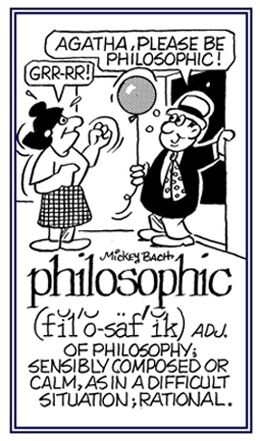sopho-, soph-, sophic, -soph, -sopher, -sophy [-osophy] -sophical, -sophically, -sophist
(Greek: wise, wisdom; knowledge)



Go to this Word A Day Revisited Index
so you can see more of Mickey Bach's cartoons.
In some religious systems, a divine spirit is referred to as the ultimate spirit of pansophy.
2. Referring to a conception of thoughts about the best way to live or how to accomplish important objectives: Carol had philosophic procedures for being successful in achieving something that is of value or worthwhile.
3. Characterizing a quiet and sensible frame of mind; being reasonable and sensible: It was good that Lisa had such a philosophic attitude of calmness when she was told that she would have to wait a little longer until the mechanic could finish repairing the water pump in her car.

Go to this Word A Day Revisited Index
so you can see more of Mickey Bach's cartoons.
2. To ponder or think about a system of moral principles, usually in a serious way for a long time: After teaching for about 25 years, Mr. Jackson philosophized about the importance of preparing students for more productive lives.

Go to this Word A Day Revisited Index
so you can see more of Mickey Bach's cartoons.
As a lexicographer, John's philosophy is to provide a dictionary with contents about entries that people can actually understand without being confused with the use of the another form of the same word to define it. For example, "an alcoholic is someone who drinks alcohol" or "an anthropologist is someone who studies anthropology".
Someone once wrote that philosophy is a system where both the speaker and the listener, to whom he is speaking, do not understand each other.
The early Greeks named their manner of studying the universe "philosophia" which is now understood to be philosophy, meaning "lover of knowledge" or, in a free translation, "the desire to know".
Inter-related cross references, directly or indirectly, involving word units meaning "know, knowledge; learn, learning": cogni-; discip-; gno-; histor-; intellect-; learn, know; math-; sap-; sci-.


